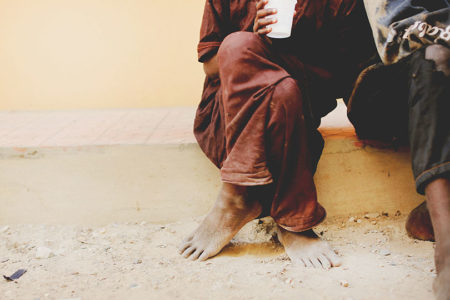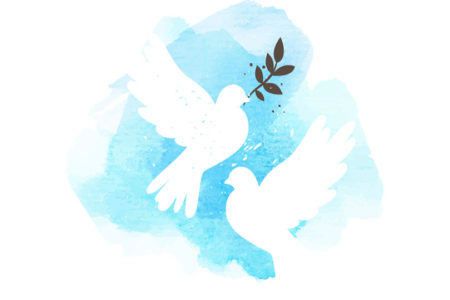Israel in the News May/Jun 2005
Reunited At Last
THE INTERNATIONAL JERUSALEM POST—Two sisters who had not seen each other since the start of World War II have been reunited through the Yad Vashem database.
Hannah Katz, 78, and Klara Blire, 81, were separated in 1939 when the Germans invaded their native Czechoslovakia. Their father sent them to take shelter with separate uncles in Hungary. The sisters lost touch with each other, and each was certain the other had perished.
On February 3, Katz’s grand-daughter, Merav Zamir, was searching the Yad Vashem database for a page of testimony concerning Katz’s mother, Sheindl Weiss. She found two pages: one that Katz had submitted and another by Blire. All the details coincided, but Zamir was not aware her grandmother had any siblings.
Zamir immediately asked Yad Vashem to track Blire down; and on the same night, the sisters and other family members got together. Both had survived camps and death marches, had moved to Israel in 1948, and had raised families only 45 miles apart.
Sharon Wrong
ARUTZ-7—Proponents of Ariel Sharon’s disengagement plan argue that withdrawal from southern Lebanon proves missile attacks will cease after Israel withdraws from Gaza. But Israel Defense Forces (IDF) reports show otherwise.
Investigative journalist David Bedein has published a declassified IDF situation report issued on June 8, 2004, and it tells a different story. The document reads, in part, “In the four years since the IDF unilaterally redeployed its troops from Lebanon, the following attacks on Israel took place from Lebanon: 34 attacks with mortar shells and anti-tank missiles into northern Israel, 7 shooting attacks with light arms fire, 8 roadside bombs planted, 127 [incidents of] antiaircraft missiles, 5 Katyusha rocket attacks, 10 infiltrations into northern Israel, 11 soldiers killed in northern Israel, 3 IDF troops kidnapped and murdered, 50 soldiers wounded, and 14 civilians killed.”
Disengagement Fiasco Continues
Only 10,000 people showed up for a recent Israeli rally to support the plan to expel the Jewish people from Judea, Samaria, and Gaza this summer. Arutz-7 reported that these numbers paled compared to the 100,000–200,000 people who have rallied against the government’s disengagement policy.
The planned demolition of 25 communities and expulsion of 8,500 Jewish people has so sharply divided Israel that it threatens to create civil war.
Threats and obscenities dominated the left-wing rally, and Peace Now leader Yariv Oppenheimer told the crowd, “Those who invite a civil war should know that we’re ready for battle,” Arutz-7 said.
Arutz-7 said the army does not realize the extent of the crisis. It reported that a high-ranking army general said, “Hundreds of soldiers will tell their officers that they simply cannot carry out the expulsion orders—if not at the first community, then at the second.” At least 10,000 soldiers have signed petitions saying they will refuse such orders.
Arutz-7 also reported the government plans to limit media coverage. Radio, television, and newspaper reporters will not be allowed to move from one community to another without permission and military escort. The only journalists who will be allowed to enter the communities will be “embedded” with military personnel, who will restrict photographers.
The IDF plans to fight the expected onslaught of disengagement opponents by closing checkpoints soon at many intersections in the northern Negev. “Don’t bother planning any weddings for the summer,” a senior IDF officer said, “because it’s not certain that your guests will be able to attend.”
Police expect to use some 50 to 60 German-bred horses to repress resistance. Each horse is reportedly equal to 100 policemen.
Have We Truly Learned Nothing?
ARUTZ-7—“What’s the purpose of memorial stones and speeches, if Europe does not find the will and the courage to defeat anti-Semitism?”
So asked Minister Natan Sharansky at Yad Vashem, speaking at the opening of the new Yad Vashem Holocaust Memorial museum in Jerusalem. Sharansky opened his speech by quoting from the newest edition of the Protocols of the Elders of Zion, a recent best seller in Syria. He quoted passages accusing Jews of killing Gentiles, kneading their blood into matzahs, and using them in religious rites.
“Before the Germans agreed to slaughter millions of defenseless Jewish men, women and children,” Sharansky said, “they were taught that the Jews are subhumans who defile and poison the German race. We should have learned from this of the great destructive potential of incitement, which prepares the ground for boundless violence.”
Sharansky warned that the recent edition of Protocols is now found in bookstores in Paris, London, and Amsterdam. “This is the tip of the iceberg of the industry of anti-Semitism that is returning to Europe from the Middle East,” the former Soviet refusenik said. “It includes books, movies, cable television programs and internet sites. The bottom line of this propaganda is: The world would be a better place without Jews. The effects of this incitement can be seen on the streets of Europe.”
“I ask myself,” Sharansky said, “what is the purpose of all the memorial sites and speeches, if the Europe of today, on the ground of which the Holocaust occurred, is not able to enlist the necessary will and courage to defeat anti-Semitism? Have we truly not learned a thing?”
Tsunami Overcomes Politics
The tsunami that killed more than 100,000 people in Southeast Asia also forged an unlikely friendship that may truly withstand the test of time. Following is the report, which ran in the January 7 issue of The International Jerusalem Post.
“Yossi and Inbar Gross said they were spending their honeymoon in Phuket [in Thailand] when the area was overwhelmed by a wall of water. ‘We and this Palestinian couple jumped on the roof of this Ford van,’ Yossi Gross told [Israeli] Army Radio. ‘Below us was a raging river, a sea that washed up into the city and dragged everything along with it. Everything was wrecked, everything was ruined.’
“Pushing aside all political differences in the joint struggle for survival, the Israelis and Palestinians spent more than four hours on top of the vehicle before they were able to climb down.
“After they made their way to a makeshift shelter, the Palestinians gave the Grosses money and assistance that enabled them to get to Bangkok and board a flight for Israel, Gross said.
“‘I have to tell you, if there’s someone I have to thank, quite simply they’re the people who got us out of there,’ he said. ‘All of our money, our passports, they were left in the hotel….Without them we couldn’t have gotten out.’
“Inbar Gross said their debt to the Palestinians is incalculable. ‘Maybe we owe them our lives,’ she said.
“Her husband said he and the Palestinians exchanged phone numbers and intend to keep in close touch, but he declined to publish their names without the consent of their new friends.
“‘Friends?’ he said. ‘Of course we are. Absolutely.’”







